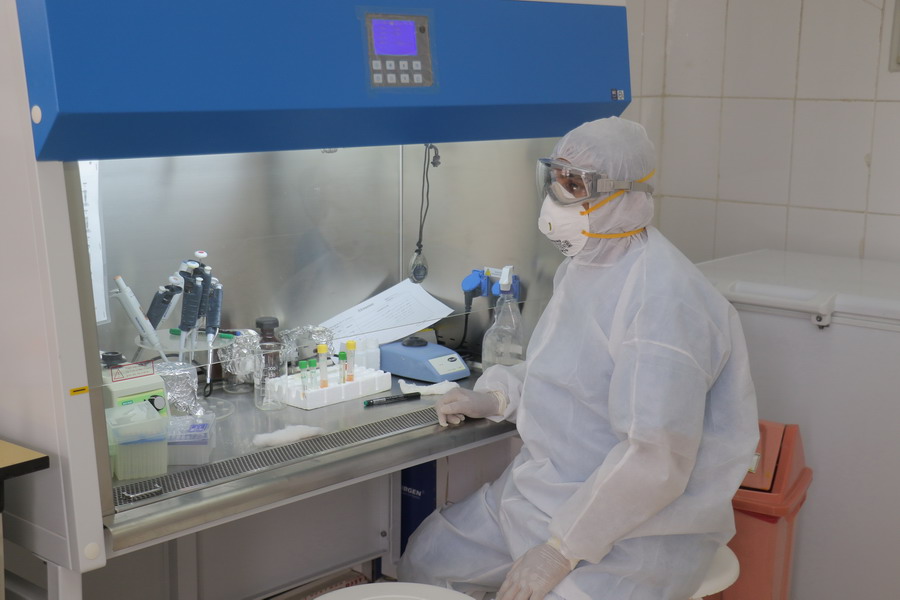
Cairo, 7 January 2021 – Countries in the World Health Organization (WHO)’s Eastern Mediterranean Region have reported over 5 million cases of COVID-19 and 123 725 deaths since the first cases was reported in the Region on 29 January 2020.
“The past year has been an exceptionally challenging time for us all. The pandemic has taken a dreadful toll on people in our Region and has further devastated health systems, economies and communities,” said Dr Ahmed Al-Mandhari, WHO Regional Director for the Eastern Mediterranean. “As the colder months set in, we warned countries and communities of a potential spike in cases. This new, grim milestone is a stark reminder that we need to continue using all available means to battle this persistent threat.”
After reaching the second peak in week 47 (starting 22 November 2020) with more than 250 000 cases and 6300 deaths, the Eastern Mediterranean Region has experienced a decline in the number of reported cases and deaths with 155 300 cases and 3046 deaths reported during week 53 (starting 27 December 2020). The situation is widely variable at the country level, where some countries are showing increasing trend (e.g. Egypt and Bahrain), others are stabilized either at high level (e.g. Tunisia and United Arab Emirates), or low levels (e.g. Kuwait, Oman and Qatar), and the remaining are showing a decline.
As of 6 January 2021 (09:00 am), the Islamic Republic of Iran has reported the highest number of cases in the Region (1 261 903 cases) followed by Iraq (599 965 cases), Pakistan (492 594 cases) and Morocco (447 081 cases). While Islamic Republic of Iran, Iraq, Pakistan, and Egypt have reported the highest number of associated deaths.
This is especially important in light of the new variant of SARS-COV 2, which has demonstrated greater transmissibility. Cases of the variant have already been reported in Jordan, Lebanon, and the United Arab Emirates. The risk of finding this new variant in other countries in the Region is high, unless effective public health and social measures are implemented. If we do not, we risk further resurgences of cases. Already, across of the world, some countries are now experiencing a third wave of infection.
Of course, we must remain vigilant and continue to apply the public health and social measures that we know work against the virus. The risk of a new spike in the number of the reported cases remains as concerning in the Region as it is globally. Detected cases of a new variant of SARS-COV 2, which shows greater transmissibility, have now been reported in Jordan, Lebanon, and the United Arab Emirates.
WHO continues to work closely with all countries in the Region to monitor the situation and provide technical support to enhance and accelerate genome sequencing for SARS-COV 2, in order to detect and monitor mutations. WHO is working with countries with no sequencing capacity to facilitate shipment of positive samples to WHO collaborating centres, including Lebanon, Libya, Sudan, and Kuwait. The Regional Reference laboratory in United Arab Emirates has been identified to provide external sequencing for the countries without such capacity in the Region.
On 31 December 2020, WHO issued its first emergency use listing for a COVID-19 vaccine and emphasized the need for equitable global access. By listing the Comirnaty COVID-19 mRNA vaccine for emergency use, the Pfizer/BioNTech vaccine became the first to receive emergency validation from WHO since the outbreak began a year ago. This clearance opens the door for countries to expedite their own regulatory approval processes to import and administer the vaccine, and allows the COVAX Facility to procure the vaccine for distribution to countries in need. Evaluation of other vaccines for safety and efficacy is ongoing.
“We advise all countries in the Region to continue implementing and monitoring COVID-19 prevention and control measures. While news of an approved vaccine is welcome, it is still too early to celebrate in our Region, where millions have been infected, and tens of millions more remain at risk. An approved vaccine will be available only for the most vulnerable groups in the coming months, and it may be many more months after that before the rest of the population is vaccinated. During this critical time, it is up to each one of us to remain alert and practice the proven preventive measures that we know can protect us and our loved ones against COVID-19,” said Dr Ahmed Al-Mandhari, WHO Regional Director for the Eastern Mediterranean.


